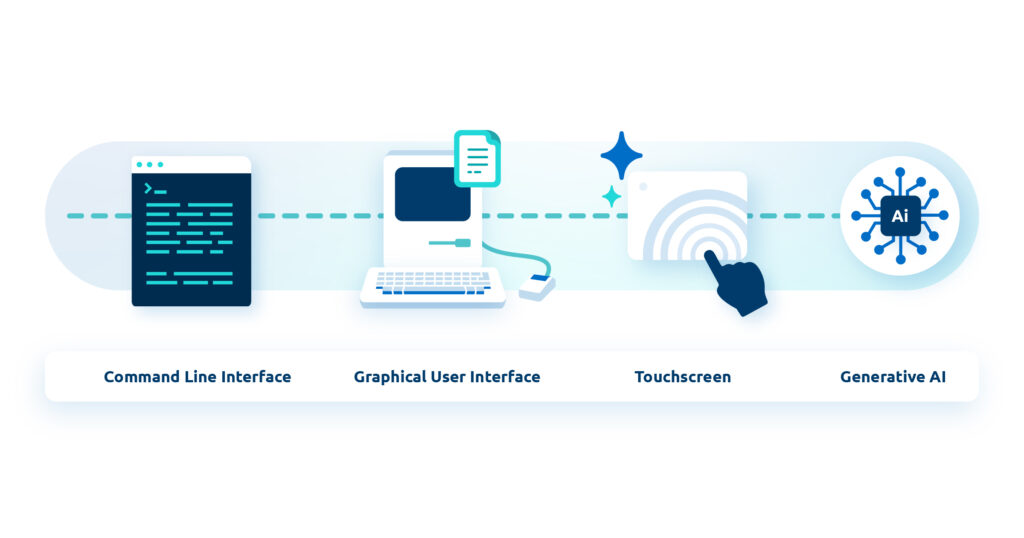It was an ordinary Tuesday afternoon in the 2000s when I first picked up an iPhone. As I played with the touchscreen, the realisation hit me that this was more than just a new piece of tech. I had the future in my hand.
Over the past two decades, major breakthroughs have revolutionised the way people interact with electronic devices, each other, and the world. Now we’re standing on the edge of another great transformation. Artificial intelligence (AI) – and specifically generative AI and natural language understanding (NLU) – will enable innovations we’ve never seen before.

At this point, you’ve likely asked ChatGPT to explain a concept. Maybe you’ve even created a hyper realistic scene in Midjourney, or designed a personal avatar with the Lensa app. While these use cases are entertaining, it’s only the beginning of how generative AI advancements will impact our work and our lives.
How Leveraging AI Improves Sales Processes
For marketing, sales enablement, and sales teams, the potential of AI is vast. Amidst a backdrop of hybrid work, economic uncertainty, reduced budgets, and boards that are asking companies to do more with less, leaders are dialled in on increasing sales productivity. And rightfully so – the days of growth at all costs have sunsetted, giving rise to efficient growth. With sales expenses typically being the largest line item on any company’s profit and loss statement, improving sales productivity is paramount.
Enter generative AI and its potential to automate, co-create, and deliver intelligence. The bad news is today’s sales professionals face arguably the hardest selling environment in a decade. The good news is that in just the next year, generative AI is poised to unlock new levels of efficiency, knowledge, and agility for customer-facing teams everywhere. AI turbocharges marketing and sales leaders’ ability to identify the behaviours of successful sellers and replicate those behaviours across your entire team, taking the guesswork out of what good looks like. And the best part? It takes you half the time and resources that it used to, streamlining workflows across the strategic enablement process of equipping, training, coaching, and analysing your revenue teams.
Right now generative AI is demonstrating pivotal potential in three key areas:
- Automation – save time for strategic work. Tedious tasks that once took hours will be completed in seconds. For instance, AI can analyse how a seller did on a call and note that they failed to deliver pricing well, and so it automatically assigns a course on pricing, along with the reinforcement lesson a week later. Not only does this save time for the salesperson, their manager, and whoever they talk to, but it enables skill building and team performance optimisation at scale. Moreover, manual work falls by the wayside as AI automatically discovers, organises, manages, and archives content. Through automation, AI will give the gift of time that can be spent on more complex, creative, and collaborative pursuits that actually move the needle.
- Co-Creation – never look at a blank page again. We are entering a future where you will open a new sales pitch template, and there’s already a draft copy tailored to the situation waiting there for you to refine and send. Think of generative AI like your personal content creator. With the right instruction, it will rapidly create everything from persona-tailored decks to product marketing assets. It can be applied to every part of your enablement process, including content, guidance, training, coaching, and analytics. Consider this coaching example: You upload a document and tell the AI to build a course, a rubric, and answers based on the content in that document. The output is almost magical.
- Instant Insights – intelligence at your fingertips. Humans can now have conversations with computers. With AI you can interrogate anything to get better, faster insights than what you could have found on your own. You’ve likely seen how quickly ChatGPT can return information on any subject and package it in consumable ways, but it’s pulling from the Internet, which is not the most accurate source of information. If we apply large language models to information we know to be true – your corpus of enablement content, for example – generative AI can serve up information that is equally deep and easy-to-consume, and accurate, giving revenue teams real-time access to the information they need. These insights extend even to coaching sellers. If a manager wants to ensure their team is cross-selling a new product in each customer meeting, they can simply query AI to analyse all customer call recordings in a given time frame and see how pervasive the cross-sell conversation is, and then coach their team accordingly.
As you read through these use case themes, you may have noticed a key common thread – the human element. AI can amplify and accelerate work across your go-to-market, but it can’t replace the people. In fact, you need people more than ever to take the draft, insight, or extra time and use it to drive strategic change with stronger strategy and better decision-making. The combination of AI and human empathy, discernment, skill, and creative thinking will help us achieve more than either technology or people could do alone.
How AI-Driven Sales Enablement Platforms Accelerate Your Sales Team
At the core of Highspot’s DNA is a relentless commitment to productivity. We have continuously delivered sales enablement software and methodology advances with a spark of magic, so our customers can ruggedise their sellers to close deals and drive revenue in any environment. Now, with generative AI taking off, that spark is about to become a wildfire.
We’ve been at the forefront of AI algorithms for sales enablement over the last decade, delivering unrivalled semantic search, recommendations in our platform and across integrations like CRM systems, and predictive content – all powered by the industry’s only patented machine-learning technology. But even more notable, for the last three years, our Science team has been building the foundation for us to use large language models and natural language understanding in delivering value for our customers. Now, we’ve arrived at that watershed moment where the preparation will pay off.
As part of our Spring ‘23 Release, we’ll be unveiling for the first time all-new innovations and functionality that harness the power of generative AI to drive unprecedented levels of sales productivity. Tune into [Highspot Discover on June 1] to find out what we’ve been building behind the scenes, and what comes next. Of course, this is just the beginning. As AI continues to evolve, so too will the possibilities for sales enablement – possibilities that may one day eclipse even the impact of touchscreen


